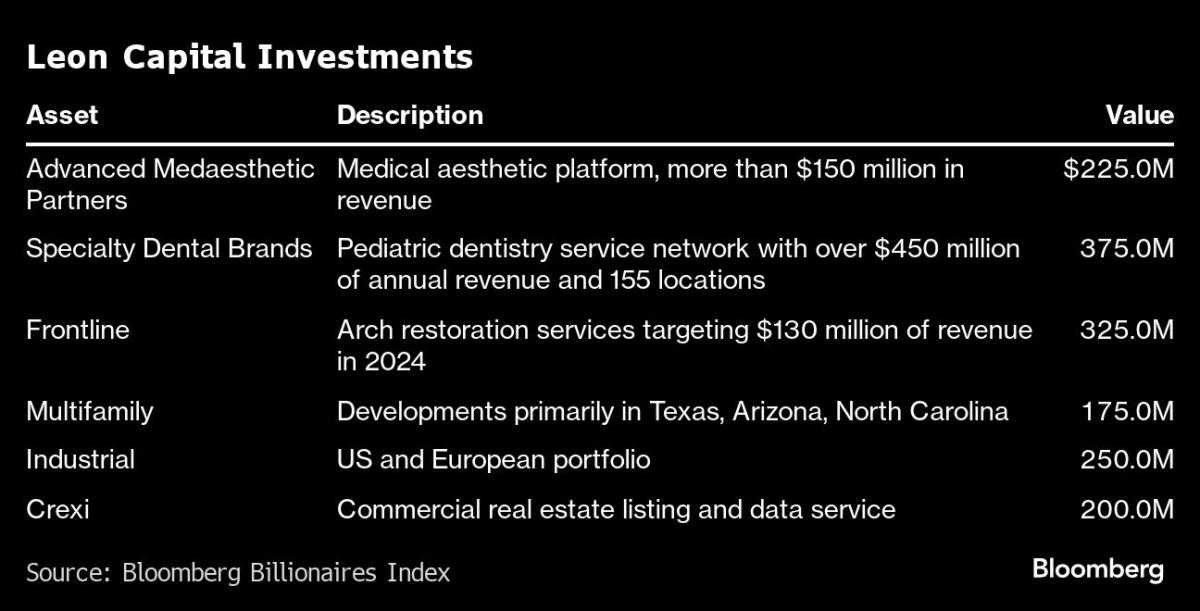
(Bloomberg) — When Fernando De Leon realized a boarding service for dogs was charging almost as much as his $30 million hotel for humans, he spotted an opportunity.
Most Read from Bloomberg
CityVet, one of the Dallas developer’s tenants at the time, built an expansive boarding space for a few hundred thousand dollars — about the same as it cost De Leon to develop a single hotel room. He offered in 2014 to help it expand with his capital and real estate knowledge. By the time he exited his stake in 2022, CityVet had grown from five to 25 locations.
The investment piqued his interest in wellness broadly, and his 100-person Leon Capital group now manages a portfolio of businesses ranging from pediatric dentistry to cardiology to medical spas. Those generate more than $800 million in revenue annually and make up the majority of his $1.6 billion fortune, valued for the first time by the Bloomberg Billionaires Index.
De Leon, 45, invests his own capital alongside medical professionals, building out administrative, technology, staffing and supply chain services to networks of practices. He says what he’s doing is different from private equity, which has plowed money into the health-care industry over the past decade in a bid to increase efficiency and boost profit.
“The private equity playbook involves overpaying for established businesses, using excessive leverage and then cutting costs quickly to flip a business in a prescribed timeline,” De Leon said in an interview from South Padre Island, Texas. “We build companies from the ground up, we don’t have any investors, we don’t have a timeline for selling or holding.”
De Leon, who spoke hours before a SpaceX rocket launch he planned to watch, said among his most interesting investments is Turnwell, a mental health network he started to treat the rise in anxiety and depression.
He has also invested in startups, like Crexi, a real estate technology service that was valued at $500 million in a 2022 funding round. De Leon said he expects it to go public in the next few years at a multi-billion-dollar valuation.
Being a billionaire is a long way from De Leon’s upbringing in Matamoros, Mexico, where he grew up sharing a room with five older siblings. Unlike them, he was born across the border in Brownsville, Texas, making him an American citizen and allowing him to attend its schools.
Learning English helped him land a translation job after the signing of the North American Free Trade Agreement, when US developers were looking to scoop up real estate across the border.
Napkin Deal
One such developer was set to build a warehouse but was missing a jobs permit. De Leon, whose family had been in Matamoras for generations, said he leveraged a connection with the head of the local labor union to secure a note on a napkin promising him the jobs permit. De Leon exchanged that napkin for a 10% equity stake in the project, and by 18 he’d made enough to get his family out of poverty, he said.
He went on to win a scholarship to Harvard University and then an investment banking job with Goldman Sachs Group Inc. in New York starting in 2001. But after getting a poor internal review, he started developing property in Dallas.
That business has changed in the last two decades, with private equity and sovereign wealth funds crowding out smaller investors like himself, De Leon said. He now avoids bidding on most established property because he can’t compete on cost of capital. Instead, he gets creative with his offers.
He recently completed the Soltra Kierland, a 202-unit luxury residential project in Scottsdale, Arizona. While he didn’t offer the highest price for what was formerly a commercial building, he was confident enough in his financing, relationships in the area and his understanding of the market to put in an offer that waived zoning contingencies.
“The manufacturing of housing is incredibly complex if done correctly,” he says. But if you have the ability to “take a piece of land that’s $10 million and build a $100 million housing complex, the Blackstones, the Starwoods of the world, will reward us very well for that.”
Not all of his bets have paid off. His investment in crypto firm Core Scientific Inc. had huge paper profits after the company went public in a SPAC merger at a $4.3 billion valuation in 2021. But about a year later, amid plummeting crypto prices, it declared bankruptcy.
“It’s difficult to see when you’re in a euphoric bubble,” De Leon said. “Thankfully, when those situations occurred, my bets have been much smaller.”
He says he commits more when he grasps businesses better, like a 2013 investment with Ross Perot Jr.’s Hillwood in European logistics when the continent was still reeling from the financial and sovereign debt crises. He put about a third of his net worth into the wager.
In a full-circle moment, De Leon is now at the early stages of building his own logistics business in Mexico to capitalize on demand from the nearshoring trend.
“Mexico is an incredibly young country with lots of available employment and a reasonably stable government,” he said. “It’s important to us now and for the future.”
Most Read from Bloomberg Businessweek
©2024 Bloomberg L.P.
EMEA Tribune is not involved in this news article, it is taken from our partners and or from the News Agencies. Copyright and Credit go to the News Agencies, email news@emeatribune.com Follow our WhatsApp verified Channel





